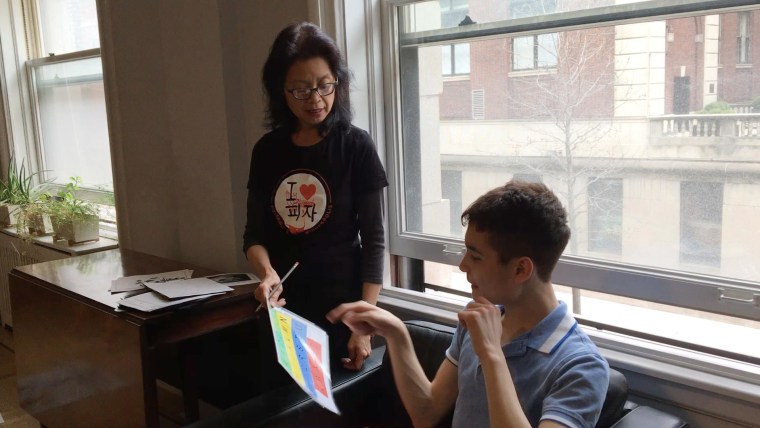No one knows when it will be safe for people to resume normal schedules, start traveling again and stop social distancing. While we all want to know what we're facing and how to plan, the increasingly long projections for self-quarantining due to the coronavirus that government officials and health experts have been giving us actually make the experience of isolation worse. Regrettably, they also decrease the likelihood that people will comply.
In the field of psychology, we have a word — "chunking" — that describes how our brains process large amounts of information. We do better at remembering things if we can divide the information into smaller pieces (chunks) that are easier for our brains to store and retrieve. This word is also used to help people break tasks into doable amounts, which increases the likelihood of positive outcomes. Cleaning a house room by room is less difficult to conceptualize than imagining a top-to-bottom cleaning in one fell swoop.
There has been a marked shift from anxiety to resignation and even hopelessness. Sustained sacrifice without a clear endpoint can feel like defeat.
Similarly, for most of us the prospect of giving something up for half a year is an eternity, but by committing to smaller increments, we can reach our goals. When the initial ask for dealing with COVID-19 was for two weeks of social distancing with the expectation of schools' opening in April, it was far easier to accept than it is now with public officials drawing out the timeline. That's why I'm trying to help my patients find ways to divide the unknown duration of this pandemic into personally tailored "chunks" of time that will help them get through it more easily.
Without chunking, we get overwhelmed and our brains tend to shut down. We stop learning, stop remembering and — most importantly — lose motivation. One of the great success stories for changing human behavior is the 12-step notion of "one day at a time." But in the fight to flatten the curve of COVID-19, we are looking at massive changes going well beyond a day at a time.
This new reality of an indefinite, ever-changing timeline has understandably led to an increase in depression among my patients. There has been a marked shift from anxiety to resignation and even hopelessness. Sustained sacrifice without a clear endpoint can feel like defeat.
In a moment of brutal honesty, a father reported to me: "There is no way I am changing my kid's diapers for months on end. I don't know how, but I will find someone to do child care." One patient in my practice said: "If it's going to last five months, what's the point of staying away from my family?" She lives alone, and her connection to her large extended family is vital to her well-being, so she's weighing the risk of visiting her elderly parents in another state against being apart for such a long time.

The gap between one day and five months is huge. Without knowing a specific end date, you get hoarding and defiance. If, instead, we want to increase people's compliance, we need to help them establish ways to think about time in such a way that accepts their feelings of anxiety or depression without succumbing to paralysis.
As one of my patients said about going on a diet: "If you ask me to give up chocolate for a day, fine. But forever? No way!" Another patient, who has breast cancer, told me the protocol for her cancer treatment is much easier to manage than thinking about the coronavirus. "My chemo treatments are spaced three weeks apart, and then I am scheduled for surgery on April 15, and two months after that I will get my scan to evaluate my prognosis." Her total treatment plan is eight months, but because it was laid out with clarity from the beginning with an established schedule, she could confidently count down the time. In striking contrast, she feels that "with the virus, I have no way to plan."
And so, as people try to wrap their minds around social distancing and waiting for the curve to flatten for months to come, we all need strategies to manage this new reality. For example, one patient and her husband had decided to try to get pregnant before the coronavirus struck. Now, she's terrified of being pregnant during the pandemic given the information that's starting to come out about the effects of the virus on pregnant women. She's worried about visiting the doctor and the prospect of having to give birth alone. At the same time, she is in her early 40s, and her biological clock is ticking loudly.
We talked about striking a balance between waiting for more information and not living with regret if she had fertility issues. Eventually, she settled on waiting two more months. Such a delay is not likely to affect her fertility, but it could make a big difference in her state of mind. By setting a new date, she was free from daily ruminations of should-she or shouldn't-she, which were interfering with her ability to focus on her work. We agreed that in eight weeks, she and her husband would revisit the question based on the information available then.
Starting each day saying "I can't do this for another four months" means starting the day angry and less resilient. Families, for instance, are in tight quarters, and financial instability in many cases is setting in. One couple I work with has different parenting styles, which is an ongoing source of tension. Being home with their two children and trying to continue their professional work is putting a tremendous strain on all of them. I urged them to stay focused on the present as the best way to cope.
There is no magical-size chunk that will keep us motivated to make the changes required to thwart this pandemic. Some people may need to conceptualize shorter timelines to stay positive, while others might benefit from taking a longer view. For me, personally, a month at a time feels just about right. It gives me an opportunity to have some things to look forward to while making sure I am being responsible in my daily decisions to practice social distancing.
I am encouraging all my patients to hunker down and try their best to commit to a chunk of time, be it a week, two weeks, two months, whatever. At the end of their chosen time frames, we will assess what worked, what didn't and what they can do better over the next chunk to get through this pandemic.


